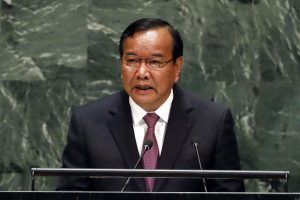Cambodia’s Prime Minister Hun Sen said yesterday said that he has nominated his country’s foreign minister, Prak Sokhonn, to be the next special envoy of the Association of Southeast Asian Nations (ASEAN) to Myanmar. The Cambodian leader made the announcement at the inauguration of a new hotel in Phnom Penh, and went on to defend his decision to engage the regime that has presided over Myanmar’s descent into chaos since it seized power in February.
Cambodia holds the rotating chairmanship of ASEAN for 2022, and has indicated that it will eschew the increasingly hard line on the regime that saw it excluded from the bloc’s last summit in October, in response to the Myanmar junta’s lack of cooperation in the implementation of the Five-Point Consensus agreed in April.
Earlier this month, Hun Sen announced that he will travel to Myanmar on January 7-8 for direct talks with coup leader Senior Gen. Min Aung Hlaing, becoming the first foreign leader to grace the military administration with an official state visit. Hun Sen has also announced that the general and his associates have the right to attend ASEAN summit meetings. “It’s a family member of ASEAN, they must have the rights to attend meetings,” he said on December 6, referring to the organization’s founding principle of “non-interference” in the affairs of member states.
Prak Sokhonn, a former Minister of Posts and Telecommunications who was appointed foreign minister in 2016, has adopted a low profile since taking the post, no doubt as a result of the dominant role that Hun Sen plays in setting the course of his country’s foreign relations. As such, he can be expected to faithfully execute the Cambodian leader’s strategy of engagement with Myanmar, whose chances of success are uncertain.
During his speech yesterday, Hun Sen defended himself against claims that Cambodia was making the situation worse by according the junta legitimacy, saying that didn’t know whether ASEAN or Cambodia could solve Myanmar’s problems, but that he should be allowed to try. “Do not place too much hope, but do not underestimate the role of Cambodia. Let Cambodia do it first,” he said, according to the state media agency Agence Kampuchea Presse. He added, “Please do not bother me, give me time. I am not your teacher and you are not my teacher.”
As I noted last week, Hun Sen views himself as a peacemaker whose experience in presiding over the end of Cambodia’s civil war in the late 1990s gives him the experience to cut the Gordian knot of Myanmar’s intersecting political, economic, and humanitarian crises, while rescuing ASEAN unity into the bargain.
For the 69-year-old Hun Sen, this would be the ideal way to close off what will be his third and final chairmanship of ASEAN. A focus on Myanmar also has the side benefit of avoiding the question of the South China Sea, which overshadowed Cambodia’s last chairmanship of ASEAN in 2012, when it intervened to block a mild criticism of Chinese actions in the vital waterway. (Hun Sen may nevertheless struggle to escape associations with Beijing during his year at ASEAN’s helm: some have already pointed out that Hun Sen’s method of engagement closely echoes the expressed preference of the Chinese government.)
But the febrile situation in Myanmar is very different from that which prevailed in Cambodia in the late 1990s, and there is no reason to believe that the kid-gloves engagement of Hun Sen and Prak Sokhonn will have any more success than did that of the last envoy, Brunei’s Second Foreign Minister Erywan Yusof. The Myanmar military, after all, is an interlocutor that has shown no compunctions about ordering the most barbaric acts of violence in defense of its seizure of power, and is seemingly opposed by the bulk of the country’s population.
Hun Sen’s decision also points to the broader challenges posed by ASEAN’s approach to the crisis, particularly the fact that the ASEAN Special Envoy role will change hands each year in tandem with the bloc’s rotating chairmanship. This avoidable decision will only prevent the bloc from taking a unified line and following it through – a fact which is all the more worrying giving the evident divisions within ASEAN on how best to treat its errant member state.
































